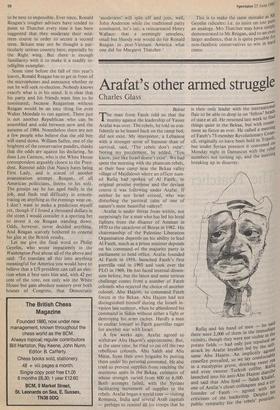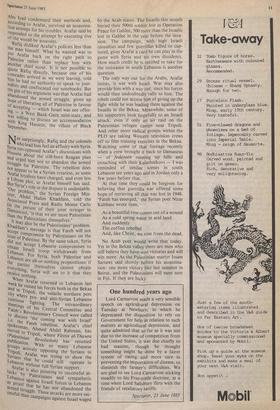Arafat's other armed struggle
Charles Glass
Beirut
The man from Fateh told us that the mutiny against the leadership of Yasser Arafat was over. The rebels, he told us con- fidently as he leaned back on the camp bed, did not exist. My interpreter, a Lebanese with a stronger sense of humour than of survival, said, 'The rebels don't exist'. Noting my puzzlement, he added, 'You know, just like Israel doesn't exist'. We had spent the morning with the phantom rebels, at their base camp near the Bekaa valley village of Majdaloun where an officer nam- ed Rafiq had spoken of Al Fateh, its original pristine purpose and the deviant course it was following under Arafat. If neither he nor Israel existed, who was disturbing the pastoral calm of one of nature's most beautiful valleys?
Arafat is under threat from within, not surprisingly for a man who has led his loyal fighters from the disaster of Amman in 1970 to the cataclysm of Beirut in 1982. His chairmanship of the Palestine Liberation Organisation depends on his ability to lead Al Fateh, much as a prime minister depends on his command of the majority party in parliament to hold office. Arafat founded Fateh in 1959, launched Fateh's first guerrilla raid in .1965 and took over the PLO in 1969. He has faced internal dissen- sion before, but the latest and most serious challenge comes from a number of Fateh colonels who rejected the choice of another colonel, Abu Hajem, to command Fateh forces in the Bekaa. Abu Hajem had not distinguished himself during the Israeli in- vasion last summer, when he abandoned his command in Sidon without either a fight or destroying his arms caches. Hardly a man to endear himself to Fateh guerrillas eager for another war with Israel.
A few weeks ago. Arafat agreed to withdraw Abu Hajem's appointment. But, at the same time, he tried to cut off the two rebellious colonels, Abu Saleh and Abu Musa, from their own brigades by putting them under his personal command. He also tried to prevent supplies from reaching the mutinous units in the Bekaa, estimates of whose strength varied from 600 to 6,000. Both attempts failed, with the Syrians facilitating movement of supplies to the rebels. Arafat began a world tour — visiting Romania, India and several Arab capitals — perhaps to remind all his troops that he
is their only leader with the international flair to be able to drop in on 'fellow' heads, of state at all. He returned last week to fin" things quiet in the Bekaa, but with resent- ment as fierce as ever. He called a meetin& of Fateh's 73-member Revolutionary Cow!" ell, originally to have been held in Trip °11' but under Syrian pressure it convened on Monday night in Damascus with the rebel members not turning up, and the meeting breaking up in disarray.
Rafiq and his band of men — he said there were 2,000 of them in the immediate vicinity, though they were not visible in tanhe potato fields — had only just repulsed attack by Arafat loyalists led by thereed self' same Abu Hajem. An implicitly agreed comfortably ceasefire prevailed, so we lay in a eucalyptus grove, drinking sweet tea aficl and even sweeter Turkish coffee. launched into his anti-Abu Hajem diatribe and said that Abu Iyad Salah Khalaf, one of Arafat's closet colleagues and a co: founder of Fateh — agreed with h!5 criticisms of the leadership. Despite.on, his sympathy for the rebels' positi
Abu lyad condemned their methods and, according to Arafat, survived an assassina- tion attempt for his troubles. Arafat said he
responded to the attempt by executing five of the would-be assassins. Rafiq disliked Arafat's policies less than the man himself. What he wanted was to Pot Arafat back on the right path to Palestine rather than replace him with another chief scout. It is not possible to quote Rafiq directly, because one of his comrades arrived as we were leaving, told him he had no authority to speak to jour- nalists and confiscated our notebooks. But the gist of his argument was that Arafat had abandoned the armed struggle, given up hope of liberating all of Palestine in favour Of accepting — which Israel was not offer- ing — a West Bank-Gaza mini-state, and
Was willing to discuss an accommodation with King
Hussein, the villain of Black September.
Not surprisingly, Rafiq and the colonels Syria too lead him feel an affinity with Syria. too opposed Arafat's discussions with Hussein about the still-born Reagan plan and urged him not to abandon the armed struggle for Palestine. The rebellion does not appear to be a Syrian creation, as some Arafat loyalists have charged, and even less a Libyan plot, as Arafat himself has said. I3ut Syria's role in the dispute is undeniable. Our problem,' the Syrian Foreign Min- ister, Abdel Halim Khaddam, told the Associated Press and Radio Monte Carlo (in the person of their joint stringer in nannascus), 'is that we are more Palestinian than the Palestinians themselves.'
It may also be the Palestinians' problem. Rhaddarn's message is that Fateh will not accept compromise by Palestinians on the did of Palestine. By the same token, Syria
obtain Israeli troop withdrawals from Lebanon. For Syria, both Palestine and Lebanon are all-or-nothing propositions: if the parties themselves cannot obtain
everything, Syria will see to it that they receive nothing.
When Arafat returned to Lebanon last week he visited his forces both in the Bekaa and in Tripoli, the volatile northern port city where pro- and anti-Syrian Lebanese continue fighting. The extraordinary Meetings of his Central Committee and Patch's Revolutionary Council were called to discuss 'the coming war with Israel' i.e. the Fateh rebellion. Arafat's chief
SP Oman, Ahmed Abdel Rahman, has moved to Tripoli, where Filson al-Thawra (Palestinian Revolution) has resumed Publication, With so groups activel many Lebanese y opping t in
Tripoli, Arafat wasos tryinghe to show the
Syrians that he could still operate in Lebanon without full Syrian support. Arafat is also pointing to successful at- tack s by Palestinians and sympathetic Lebanese against Israeli forces in Lebanon as proof that he has not abandoned the armed struggle. These attacks are more suc- cessful than campaigns against Israel waged by the Arab states. The Israelis this month buried their 500th soldier lost in Operation Peace for Galilee, 500 more than the Israelis lost in Galilee in the year before the inva- sion. The campaign, with high Israeli casualties and few guerrillas killed or cap- tured, gives Arafat a card he can play in the game with Syria and his own dissidents. How much credit he is entitled to take for the resistance in south Lebanon is another question.
The only way out for the Arabs, Arafat insists, is war with Israel. War may also provide him with a way out, since his forces would then undoubtedly rally to him. The rebels could not accuse him of giving up the fight while he was leading them against the Israelis in the Bekaa. Meanwhile, some of his supporters look hopefully to an Israeli attack, even if only an air raid on the Palestinian refugee camps near Tripoli. And other more radical groups within the PLO are taking Western television crews off to film training exercises in the Bekaa. Watching some of that footage recently when a crew brought it back to Damascus — of fedayeen running up hills and crouching with their Kalashnikovs — I was reminded of similar scenes in south Lebanon ten years ago and in Jordan only a few years before that.
At that time they could be forgiven for believing that guerrilla war offered some hope of retrieving all that was lost in 1948. `Fateh has emerged,' the Syrian poet Nizar Kabbani wrote then, As a beautiful rose comes out of a wound As a cold spring water in arid land And suddenly The coffins rebelled And, like Christ, we rose from the dead.
No Arab poet would write that today. Yet in the Bekaa valley there are men who still believe they have won victories and will win more. As the Palestinian martyr Issam Sartawi said shortly before his assassina- tion: one more victory like last summer in Beirut, and the Palestinians will meet next in Fiji. If they are lucky.



















































 Previous page
Previous page